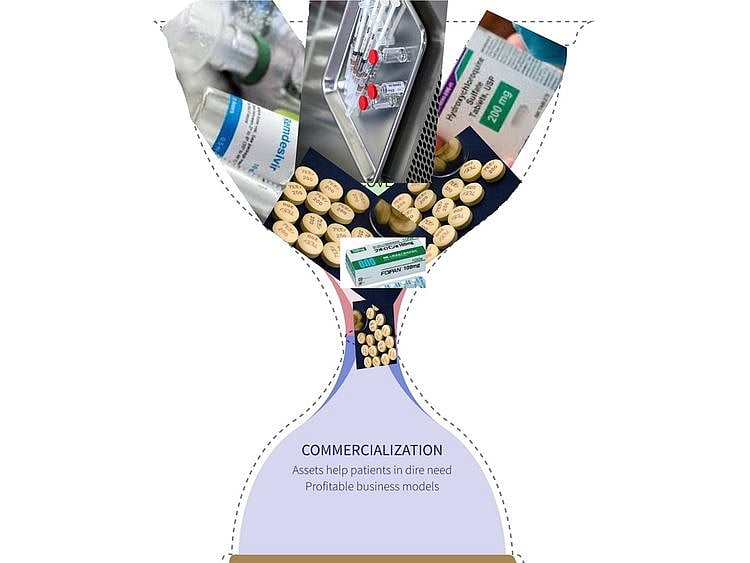Anti-COVID-19 weapons: Teaching old drugs new tricks
Open data, ramped up trials on "repurposed" drugs piling up against SARS-CoV-2

Highlights
- Arsenal of drugs "repurposed" to fight coronavirus grows
- Studies prove some therapies and drugs effective against COVID-19, but others are not
- Strategy seen as practical stop-gap measure against deadly virus
- Clinicians working on numerous trials on repurposed drugs across the world
Dubai: It's not immediately known if these old drugs would work with a knock-out effect on a new target, COVID-19.
But drug "repurposing" — essentially teaching old drugs new tricks — means those therapies are already available, with a good safety profile and can be used immediately.
And while the knowledge gap in the fight against SARS-CoV-2 remains wide, numerous clinicians are conducting drug repurposing experiments aided by big data and heightened scientific collaborations.
It's still a sort of hit-or-miss, one-by-one exploration against the recently-emerged pathogen. Moreover, two hurdles stand in the way: (1) The cost and (2) availability of these experimental drugs. Trials are only possible if the drugs under investigation are within reach by clinicians.
First line of defence
Since no safe and effective shot has been officially declared winner among the “candidate vaccines” so far, drug repurposing is one line of defence worth investigating.
Authorities had been quick to react, through emergency-use authorisations (EUAs), allowing many pharmacologic therapies for use in combating COVID-19, under strict guidelines.
And, among the available therapies or drugs, there’s no one therapy that delivers a single blow against SARS-CoV-2. Instead, doctors are using multiple options available, and many gave “encouraging results”.
To identify and test re-purposable drug candidates, data-driven and experimental approaches have been used.
It's still a sort of hit-or-miss, one-by-one exploration against the recently-emerged pathogen. Moreover, two hurdles stand in the way: (1) The cost and (2) availability of these experimental drugs.
Trials are possible anywhere the drugs under investigation are within reach by clinicians.
Knowledge sharing
As a result, knowledge is piling up. Fiercepharma reports that there are at least 31 trials on existing drugs being repurposed to fight COVID-19.
Researchers conduct studies on individual drugs or in combination with others against the new pathogen, while sharing their clinical findings on covid-db.com, an open global database.
Due to widespread COVID-19 infections, some clinicians are able to conduct tests on live cases, using double-blind, placebo controlled clinical studies — the best and most reliable form of clinical research on drugs or treatments. This adds to the global database on the profile of repurposed therapies.
An Anticancer Fund report states that there are 211 clinical trials registered in the COVID-19 inpatient database, of which 65% include repurposed drugs.
Drug repurposing, or drug repositioning, is a cost-efficient way to find new treatment options. Researchers can move forward quickly as the drugs are already tested on safety. As for covid-db, there are key benefits in sharing structured studies. One, it it allows clinicians to better understand the in-patient course of the disease and, two, it allows them to quickly identify the positive experiences in the treatment in order to update guidelines for the treatment and use of medication.
This route may sound easy, but it’s clearly not. One is the safety and scientific validity of the studies published being the responsibility of the study sponsor and investigators.
Major technological and regulatory hurdles stand in the way, too. With medical journals, the results must undergo critical review by peers, who might throw the manuscripts back to the researchers. Following review, basic science demands that results must proven effective and can be replicated, when using the same variables.
Advantages of drug “repurposing”
So what’s the big idea behind drug repurposing?
By successfully demonstrating the safety and efficacy of existing medicines, experts say this route may play an important role in the eventual treatment of COVID-19 positive patients.
DRUG REPURPOSING
It is believed that some drugs may work for the treatment of patients who face severe infections. By definition, drug repurposing (also called drug “repositioning”, “reprofiling” or “re tasking”) is a strategy to identify new uses for approved or investigational drugs outside the scope of the original medical indication.
An article in Nature outlines key drug repurposing advantages: Given the high cost and slow pace of developing new drugs, repurposing of “old” drugs to treat both common and rare diseases is increasingly becoming an attractive proposition.
This involves the use of “de-risked” compounds, with potentially lower overall development costs and shorter development timelines – and immediate relief for patients, potentially flattening the death curve.
There are several known therapies being tried in different countries, in addition to convalescent plasma therapy (CPT), against COVID-19.
Following is our list (updated as of June 14, 2020) of the treatments greenlighted by authorities in different jurisdictions for repurposing:
Sign up for the Daily Briefing
Get the latest news and updates straight to your inbox
Network Links
GN StoreDownload our app
© Al Nisr Publishing LLC 2026. All rights reserved.